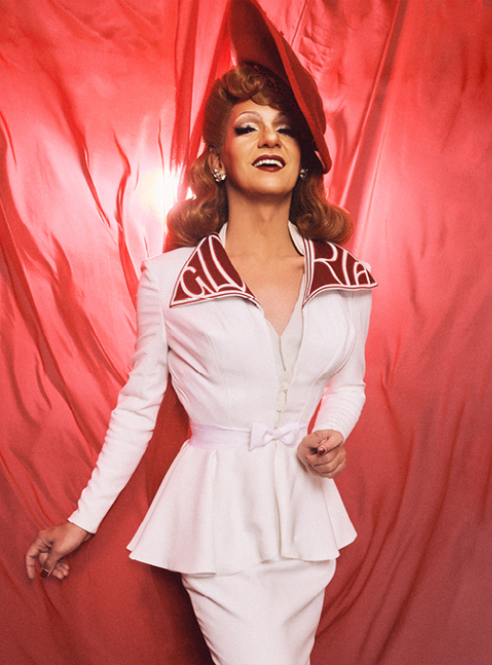
Sophia Neilsen
copy editor
Gloria Swansong wants people to know the history of queerness.
In a lecture sponsored by the LGBTQ+ and Friends at Chautauqua, Swansong will discuss “Why Is Drag So Controversial Today?” at 12:15 p.m. today in Smith Wilkes Hall, alongside Mama Shirley Naytch serving as MC.
Swansong is a professional drag queen from New York City and acclaimed Judy Garland impersonator who earned the title of Miss Hell’s Kitchen three years in a row. A costume designer who holds an MFA in costume design from Carnegie Mellon University, said she enjoys being her own boss. Roles as a drag artist, educator, clothes-maker and designer all allow her to ”exercise all of the creative muscle.”
Swansong, who was formerly an educator at New York University’s Tisch School for the Arts, said much of her activism includes an educational component.
“Most of my activism is educational,” she said, adding that she hopes the audience can learn a new perspective from her lecture.
“So many people’s first exposure to drag is whatever misinformation they’re getting,” she said. “I do hope that exposure to new conversations and new ideas, plant seeds in people’s brains and that they go off and begin to have conversations or to self-educate using resources, and open up their worldview.”
During her talk, she plans to explain what makes drag unique, why it’s been controversial and why it is inherently political.
Naytch, a professional drag queen from Washington, D.C., explained why drag is important, particularly when considering the Week Eight theme, “Freedom of Expression, Imagination and the Resilience of Democracy.”
“Drag is … a gender expression,” said Naytch. “It’s more the creative outlet to self-express and self-identify who your best version or biggest version of yourself wants to be.”
In 2019, Naytch worked with Chautauqua Visual Arts on a drag show that drew 400 people. The following year, during the COVID-19 shutdown, a drag show webinar hit its 1,000-person limit. Back in-person at the Athenaeum Hotel in 2021, the drag performance was so popular that in 2022 one was hosted in Norton Hall.
“It just goes to prove how important drag is to this community, and how much folks want to support it and be a part of the conversation,” Naytch said.
Even without a full drag performance at the Institution this year, the lecture will continue the conversation, Naytch said.
Drag shows and pageants often result in giving back to the community, Swansong said.
“Being a titleholder means that you are a representative for the charity that the title is attached to,” she said. “The history of drag is such that many drag artists do a lot of charity work and so we attach any competitions and pageants to charity work.”
As a part of teaching queer history, Swansong also discusses the criminalization of drag. Swansong is originally from Nashville, Tennessee, where the state government is trying to pass legislation criminalizing drag in public spaces.
Many states are in the process of enacting similar laws, Swansong said, where officials want carte blanche to decide if people are sex workers based on how they are dressed or presenting.
“Drag is a really expansive art form, and it’s not easily definable,” she said. “But the reason they’re vague is so that they purposefully can arrest who they want to arrest or who they deem to visibly queer faces.”
Because of the challenges the queer community faces, Swansong wants people to know the true meaning of activism: taking action.
Activism is not just about big events and marches but also, she said about having “to have difficult conversations with people in your everyday life. … Because change begins small, and change begins (from) one person to one person.”
She said that despite, or because of, the way society has unjustly mistreated the LGBTQ community, the drag community becomes a “family” and protects and helps each other through life.
“My drag family is just a chosen family and extended family who understands me intimately,” Swansong said, “and we support each other in our drag community.”




